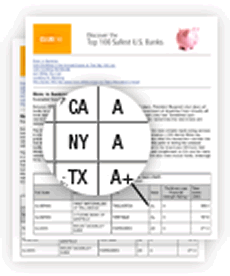Credit Crisis 2011, Discover the Top 100 Safest U.S. Banks
Personal_Finance / Credit Crisis 2011 Jun 09, 2011 - 02:23 PM GMTBy: EWI
 Bank failures still dominate headlines as the number of failing banks continues at an alarming pace in 2011. The odds are that you've seen at least one bank failure in your community since the financial crisis hit in 2008. Some economists claim we're in a recovery, yet hundreds of smaller financial institutions still suffer from the debt crisis that began a few years back.
Bank failures still dominate headlines as the number of failing banks continues at an alarming pace in 2011. The odds are that you've seen at least one bank failure in your community since the financial crisis hit in 2008. Some economists claim we're in a recovery, yet hundreds of smaller financial institutions still suffer from the debt crisis that began a few years back.
Consider this post from author Kalyan Nandy, on the popular Atlanta real estate site CityBiz:
"Bank failures continue with no end in sight. Last Friday, U.S. regulators closed down three more banks, taking the total number to 43 so far in 2011…Looking back, there were 157 bank failures in 2010, 140 in 2009 and 25 in 2008.
"Issues like rock-bottom home prices, still-high loan defaults and deplorable unemployment levels are nagging troubles for such institutions…
"The number of banks on FDIC's list of problem institutions shot up to 884 in the fourth quarter of 2010 from 860 in the previous quarter. This is the highest number since the savings and loan crisis in the early 1990s."
 The following excerpt from Elliott Wave International's free report, Discover the Top 100 Safest U.S. Banks, explains the true risk that you may face when a bank fails.
The following excerpt from Elliott Wave International's free report, Discover the Top 100 Safest U.S. Banks, explains the true risk that you may face when a bank fails.
Why do banks fail? For nearly 200 years, the courts have sanctioned an interpretation of the term "deposits" to mean not funds that you deliver for safekeeping but a loan to your bank. Your bank balance, then, is an IOU from the bank to you, even though there is no loan contract and no required interest payment. Thus, legally speaking, you have a claim on your money deposited in a bank, but practically speaking, you have a claim only on the loans that the bank makes with your money. If a large portion of those loans is tied up or becomes worthless, your money claim is compromised.
A bank failure simply means that the bank has reneged on its promise to pay you back. The bottom line is that your money is only as safe as the bank's loans. In boom times, banks become imprudent and lend to almost anyone. In busts, they can't get much of that money back due to widespread defaults. If the bank's portfolio collapses in value, say, like those of the Savings & Loan institutions in the U.S. in the late 1980s and early 1990s, the bank is broke, and its depositors' savings are gone…
The U.S. government's Federal Deposit Insurance Corporation guarantee just makes things far worse, for two reasons. First, it removes a major motivation for banks to be conservative with your money. Depositors feel safe, so who cares what's going on behind closed doors? Second, did you know that most of the FDIC's money comes from other banks? This funding scheme makes prudent banks pay to save the imprudent ones, imparting weak banks' frailty to the strong ones. When the FDIC rescues weak banks by charging healthier ones higher "premiums," overall bank deposits are depleted, causing the net loan-to-deposit ratio to rise. This result, in turn, means that in times of bank stress, it will take a progressively smaller percentage of depositors to cause unmanageable bank runs.
If banks collapse in great enough quantity, the FDIC will be unable to rescue them all, and the more it charges surviving banks in "premiums," the more banks it will endanger. Thus, this form of insurance compromises the entire system. Ultimately, the federal government guarantees the FDIC's deposit insurance, which sounds like a sure thing. But if tax receipts fall, the government will be hard pressed to save a large number of banks with its own diminishing supply of capital. The FDIC calls its sticker "a symbol of confidence," and that's exactly what it is.
Read our free 10-page report, Discover the Top 100 Safest U.S. Banks, to learn:
• The 5 major conditions at many banks that pose a danger to your money.
• The top two safest banks in your state.
• Bob Prechter's recommendations for finding a safe bank.
• And more!
This article was syndicated by Elliott Wave International and was originally published under the headline Money in the Bank: Does It Still Mean "Safe and Sound?". EWI is the world's largest market forecasting firm. Its staff of full-time analysts led by Chartered Market Technician Robert Prechter provides 24-hour-a-day market analysis to institutional and private investors around the world.
About the Publisher, Elliott Wave International
Founded in 1979 by Robert R. Prechter Jr., Elliott Wave International (EWI) is the world's largest market forecasting firm. Its staff of full-time analysts provides 24-hour-a-day market analysis to institutional and private around the world.
© 2005-2022 http://www.MarketOracle.co.uk - The Market Oracle is a FREE Daily Financial Markets Analysis & Forecasting online publication.



